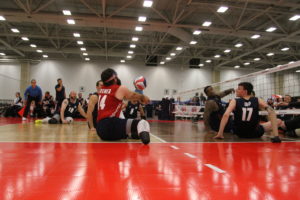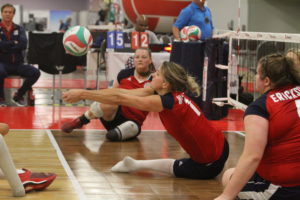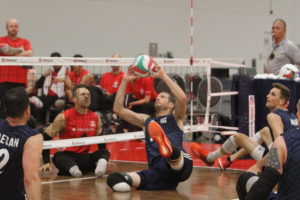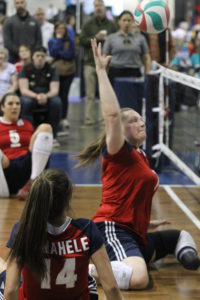Sitting Volleyball: A Team Sport With A Super Fast Pace
You are on the floor. Your opponent hits the ball over the net right at you. You have little time to react, but must return it back over the net and land it in the opposing team’s half of the court to score a point. This is the objective for the sport of sitting volleyball. Sitting volleyball is pretty much the same as standing volleyball, with some minor adaptations. In particular, it is a great game for individuals with lower limb loss or limitations. Recreationally though, it is a fantastic inclusive game, as able-bodied athletes are playing the sport as well.

If you’ve never watched a game of sitting volleyball, it may appear different. “When I first saw it, I thought it was actually silly,” said Warfighter Dan Regan, a member of the U.S. National Men’s Sitting Volleyball Team. “But once I watched it at the competitive level, it changed my perception. I’m glad I sat down and tried it.”
For Regan, he loves the speed of the game. “It is a small court (six meters x ten meters), so you don’t have much time to respond,” he said. “Your competitive nature kicks in … you get one or two swings in and adrenaline kicks in. I lost my leg, but I didn’t lose my competitive drive.”
Another element that players enjoy about the sport is the camaraderie. It is, indeed, a team sport. “I love my teammates,” said Nichole Millage, a member of the U.S. National Women’s Sitting Volleyball Team who is hoping to play in her fourth Paralympic Games in 2020. “We are all different but come together. It’s like having another family in my life.”
WHAT YOU NEED TO KNOW
Unlike a number of adaptive sports that have a high cost of entry due to the adaptive equipment that is needed to participate, sitting volleyball requires very little.
Greg Walker, the head coach for USA Men’s Sitting Volleyball Team since 2016, suggests you can get into the sport with some basic clothing items and pads. “Tighter clothes help with sliding around (the floor) better. Knee pads and baseball sliders will also provide additional padding and help to prevent floor burn. “You are sliding around the floor on your rear end. If you turn your legs to the side, it will also help you avoid floor burn.”
In terms of the game itself, Walker says other than the court being smaller, the net being lower, and the athletes sitting on the floor, everything else is the same as standing volleyball. Matches are played over a best of five sets format with each set won by the first team to reach 25 points (with at least a two-point lead). A match is won by the team that wins three sets. If a decisive fifth match is necessary, the first team to reach 15 points with a two point lead wins.

Teams have up to three contacts with the ball before it must go over the net. A team scores a point by successfully grounding the ball on the opponents’ playing court; when the opponent team commits a fault; or when the opponent team receives a penalty. (A team commits a fault by making a play contrary to the rules.) At the moment of contacting the ball, a player’s bottom must be in contact with the floor.
If it is your first time out on the court, Walker suggests you learn how to move around the floor. “It is an easy transition for people who have seen the game before,” he said. “Players should try to use their legs. Often they want to use their arms first.” He also encourages athletes to chamber their legs to one side. New players should also focus on ball handling.
Because it is a short court, it makes the game superfast. “I like that it is quick paced,” Millage said. “You have to think two or three steps ahead.” Therefore, the game also involves a bit of strategy, and teams can work on controlling the speed or pace of the game. “You have to see something happen before it happens,” she said.
Like with any sport, practice makes perfect. It takes time to get the hang of things. “When I started, I was horrible,” Millage said. At first, she found it to be really hard, thinking “I don’t know if I can do this, maybe it is not for me.” That obviously changed. Now, “sitting volleyball is where it is at for me. It is tough to sit on the sidelines and watch everyone else play.”
ADAPTATIONS
If you have a prosthetic leg, it is recommended to not wear it when playing sitting volleyball. It could limit one’s speed and movement abilities during play. Additionally, if an athlete or teammate falls on it, it could cause injury to them or damage the prosthesis. Users of a prosthetic arm can use it to pass, serve, and block.

Regarding your body positioning on the floor, the position of each player is determined and controlled by the position of their bottoms. This means that the hand(s) and/or leg(s) may cross the service, attack, and center lines, provided they do not interfere with an opposing player. A player’s “bottom” is defined as the upper part of the body, from the shoulder to one’s buttocks. Players are not allowed to lift his/her bottom from the court when executing any type of attack-hit. Additionally, it is forbidden to stand up, raise the body or take steps to play a ball.
In addition to the differences mentioned earlier regarding court size and net height there is also a difference regarding the serve. Unlike standing volleyball, it is permitted to block or attack an opponent’s serve.
TAKING IT TO THE NEXT LEVEL
As the team’s skill level progresses, teams can focus on offense and defense systems of serving the ball, attacking, and other strategies. Then it becomes more about improving individual skills and as a team. Regan suggests you can do so by watching video of yourself and opponents and make adjustments accordingly.
Once you move from the recreational to the competitive level, there are tournaments and competitions you can enter. A number of collegiate programs are also available for interested athletes. In fact, both the Men’s and Women’s National Team is based at the University of Central Oklahoma, a chapter of Disabled Sports USA located in Edmond. Athletes interested in competing at that elite level have the opportunity to pursue full-time resident housing and the training center at UCO. In addition, they can also attend the college as well. “Not a day goes by that I don’t enjoy what I do,” Regan said. “I get to play volleyball.”
WHERE TO PLAY

Regan encourages anyone to give sitting volleyball a try. “I would encourage people to get out and try things. For me, it was volleyball,” he said. About a dozen Disabled Sports USA chapters offer sitting volleyball as either a recreational or competitive sport. You can find that listing at https://moveunitedsport.org/chapters/locationmap/. Parasport clubs would also be an to explore
PHOTOS COURTESY OF USA VOLLEYBALL/BILL KAUFFMAN
NOTE: This article originally appeared in the Winter 2019 of Challenge magazine. You can check out the full issue here.

